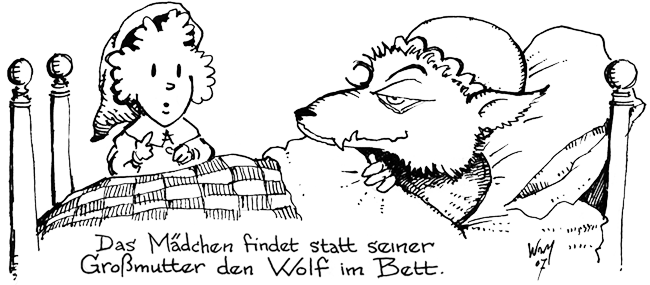![]() Determiners:Possessivpronomen Als Artikel - Genitiv
Determiners:Possessivpronomen Als Artikel - Genitiv
Possessive pronouns are a type of determiner, similar in their function to definite and indefinite articles.
The genitive case is used to describe ownership, so the genitive possessive determiners also describe ownership.
| Rotkäppchen musste zum Hause seiner Großmutter gehen. | Little Red Riding Hood had to go to her grandmother's house. |
| Die Großmutter freut sich auf den Besuch ihres Enkelkindes. | The grandmother is looking forward to her grandchild's visit. |
| subjects: | Little Red Riding Hood (she has to go visit her grandmother) | the grandmother (she is looking forward to a visit) |
| genitive objects: | grandmother (LRRH is going to her house) | grandchild (grandma is looking forward to her visit) |
![]() Possessive determiners in the genitive case
Possessive determiners in the genitive case
There are no 'basic' genitive forms of the possessive determiners, since the ending is influenced by the gender of the noun. So, here is the overview of what does happen:
| masculine noun follows (-es suffix +(e)s on the noun) |
feminine noun follows (-er suffix) |
neuter noun follows (-es suffix + (e)s on the noun) |
plural noun follows (-er suffix) |
| meines Wolfes | meiner Großmutter | meines Kindes | meiner Blumen |
| deines Wolfes | deiner Großmutter | deines Kindes | deiner Blumen |
| seines Wolfes | seiner Großmutter | seines Kindes | seiner Blumen |
| ihres Wolfes | ihrer Großmutter | ihres Kindes | ihrer Blumen |
| seines Wolfes | seiner Großmutter | seines Kindes | seiner Blumen |
| uns(e)res Wolfes | uns(e)rer Großmutter | uns(e)res Kindes | uns(e)rer Blumen |
| eu(e)res Wolfes | eu(e)rer Großmutter | eu(e)res Kindes | eu(e)rer Blumen |
| ihres Wolfes | ihrer Großmutter | ihres Kindes | ihrer Blumen |
| Ihres Wolfes | Ihrer Großmutter | Ihres Kindes | Ihrer Blumen |
Notice that unser or euer can drop the original intermediate -e- with all genders in the genitive case! Masculine and neuter nouns that are one syllable long are often used with an -es instead of an -s suffix.
![]() Genitive prepositions and the possessive determiners
Genitive prepositions and the possessive determiners
You also use genitive possessive determiners following the genitive prepositions: anstatt, trotz, während, and wegen.
| Während seines* Spaziergangs trifft Rotkäppchen einen Wolf. | During her walk, Little Red Riding Hood meets a wolf. |
| Das Mädchen findet statt seiner Großmutter den Wolf im Bett vor. | The little girl finds the wolf in the bed instead of her grandmother. |
* Leider ist Rotkäppchen grammatisch neutrum (ergo das 'sein')
![]() Possessive pronouns
Possessive pronouns
Possessive determiners can replace an entire noun phrase - as long as the referent is very clearly established (i.e., you know from a previous sentence or phrase what the pronoun refers to). In this case, the determiners become possessive pronouns. Here is an example set:
Der Wolf ist verwirrt, und meint das alles ihm gehört ... und Rotkäppchen wird entschlossener.
| der Wolf | Rotkäppchen | ||
| masculine | Ich liege auf der Lauer im Schatten meines Waldes! | Im Schatten deines Waldes? Nein! Unseres! | In the shadows of your forest? No, of ours! |
| feminine | Das ist die Brille meiner Großmutter! | Deiner Großmutter? Nein, meiner! | Your grandmother's? No, mine! |
| neuter | Ich freue mich auf den Geschmack meines Mittagessens! | Den Geschmack deines Mittagessens? Nein, meines! Oh, Moment mal, ich will meine Großmutter nicht essen! | The flavor of your lunch? No, mine! Oh, wait a minute, I don't want to eat my grandmother! |
| plural | Hast du Angst vor dem Klang meiner großen Zähne? | Nein, aber hast du Angst vor dem Klang meiner? | No, but are you afraid of the sound of mine? |
The endings on the possessive pronouns are the same as der-words in the dative case.


